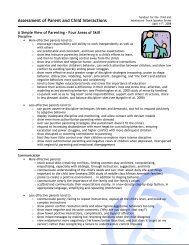Center for Academic Excellence Writing Assessment ... - eGo Main
Center for Academic Excellence Writing Assessment ... - eGo Main
Center for Academic Excellence Writing Assessment ... - eGo Main
You also want an ePaper? Increase the reach of your titles
YUMPU automatically turns print PDFs into web optimized ePapers that Google loves.
The Atlantic Online | June 2009 | What Makes Us Happy? | Joshua Wolf Shenk<br />
12/31/09 10:15 PM<br />
not just treat disease. But in many ways, his role in the movement is as provocateur. Last October, I watched him give a<br />
lecture to Seligman’s graduate students on the power of positive emotions—awe, love, compassion, gratitude, <strong>for</strong>giveness,<br />
joy, hope, and trust (or faith). “The happiness books say, ‘Try happiness. You’ll like it a lot more than misery’—which is<br />
perfectly true,” he told them. But why, he asked, do people tell psychologists they’d cross the street to avoid someone who<br />
had given them a compliment the previous day?<br />
In fact, Vaillant went on, positive emotions make us more vulnerable than negative ones. One reason is that they’re futureoriented.<br />
Fear and sadness have immediate payoffs—protecting us from attack or attracting resources at times of distress.<br />
Gratitude and joy, over time, will yield better health and deeper connections—but in the short term actually put us at risk.<br />
That’s because, while negative emotions tend to be insulating, positive emotions expose us to the common elements of<br />
rejection and heartbreak.<br />
To illustrate his point, he told a story about one of his “prize” Grant Study men, a doctor and well-loved husband. “On his<br />
70th birthday,” Vaillant said, “when he retired from the faculty of medicine, his wife got hold of his patient list and secretly<br />
wrote to many of his longest-running patients, ‘Would you write a letter of appreciation?’ And back came 100 single-spaced,<br />
desperately loving letters—often with pictures attached. And she put them in a lovely presentation box covered with Thai<br />
silk, and gave it to him.” Eight years later, Vaillant interviewed the man, who proudly pulled the box down from his shelf.<br />
“George, I don’t know what you’re going to make of this,” the man said, as he began to cry, “but I’ve never read it.” “It’s very<br />
hard,” Vaillant said, “<strong>for</strong> most of us to tolerate being loved.”<br />
Vaillant brings a healthy dose of subtlety to a field that sometimes seems to glide past it. The bookstore shelves are lined<br />
with titles that have an almost messianic tone, as in Happier: Learn the Secrets to Daily Joy and Lasting Fulfillment. But<br />
what does it mean, really, to be happier? For 30 years, Denmark has topped international happiness surveys. But Danes are<br />
hardly a sanguine bunch. Ask an American how it’s going, and you will usually hear “Really good.” Ask a Dane, and you will<br />
hear “Det kunne være værre (It could be worse).” “Danes have consistently low (and indubitably realistic) expectations <strong>for</strong><br />
the year to come,” a team of Danish scholars concluded. “Year after year they are pleasantly surprised to find that not<br />
everything is getting more rotten in the state of Denmark.”<br />
Of course, happiness scientists have come up with all kinds of straight<strong>for</strong>ward, and actionable, findings: that money does<br />
little to make us happier once our basic needs are met; that marriage and faith lead to happiness (or it could be that happy<br />
people are more likely to be married and spiritual); that temperamental “set points” <strong>for</strong> happiness—a predisposition to stay<br />
at a certain level of happiness—account <strong>for</strong> a large, but not overwhelming, percentage of our well-being. (Fifty percent, says<br />
Sonja Lyubomirsky in The How of Happiness. Circumstances account <strong>for</strong> 10 percent, and the other 40 percent is within our<br />
control.) But why do countries with the highest self-reports of subjective well-being also yield the most suicides? How is it<br />
that children are often found to be a source of “negative affect” (sadness, anger)—yet people identify children as their<br />
greatest source of pleasure?<br />
The questions are unresolved, in large part because of method. The psychologist Ed Diener, at the University of Illinois, has<br />
helped lay the empirical foundation <strong>for</strong> positive psychology, drawing most recently on data from the Gallup World Poll,<br />
which interviewed a representative sample of 360,000 people from 145 countries. “You can say a lot of general things from<br />
these data that you could never say be<strong>for</strong>e,” Diener says. “But many of them are relatively shallow. People who go to church<br />
http://www.theatlantic.com/doc/print/200906/happiness<br />
Page 13 of 20





